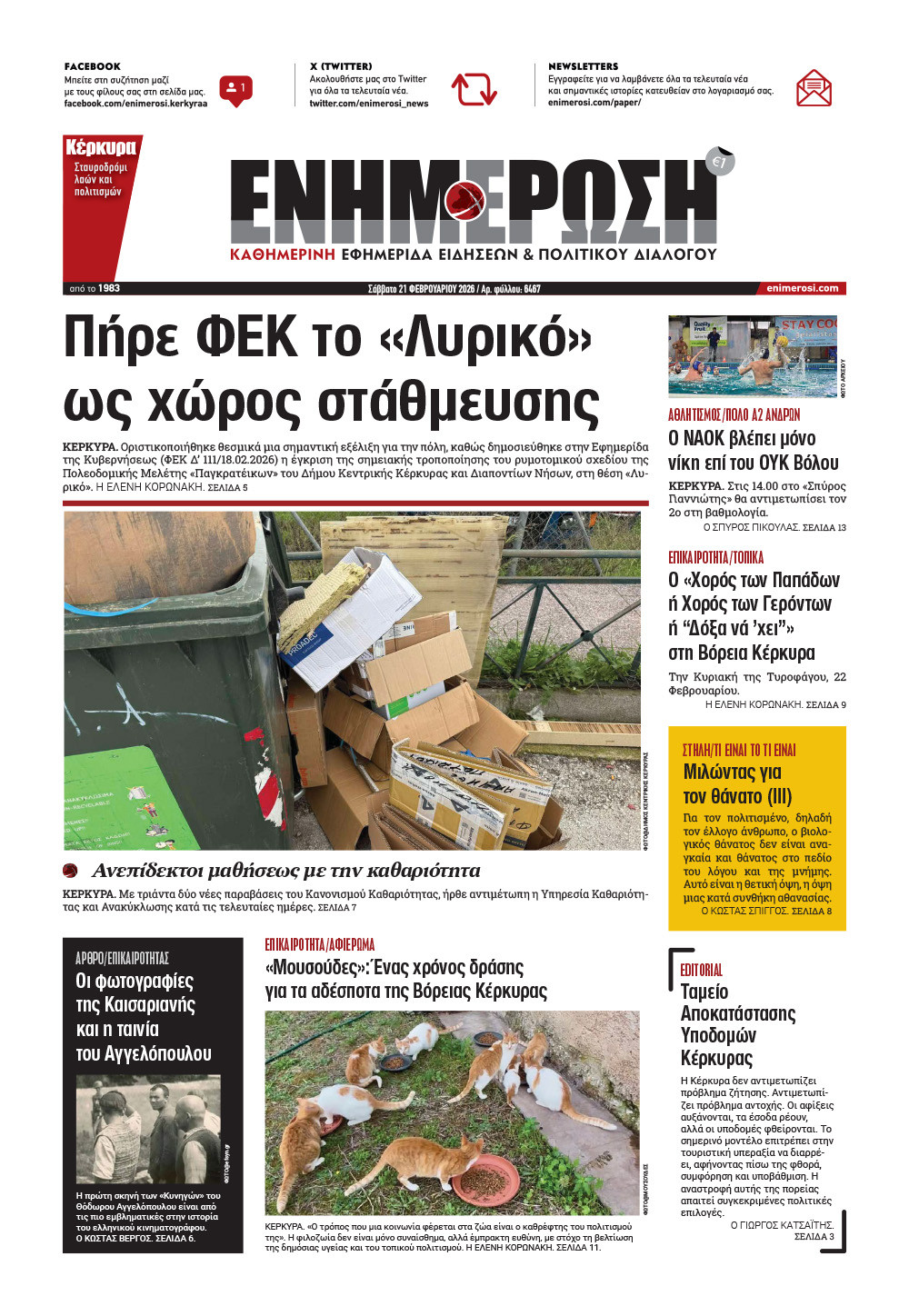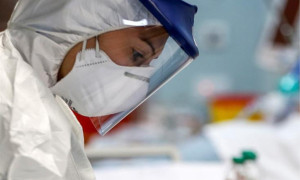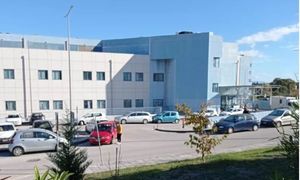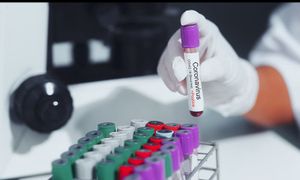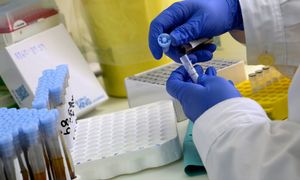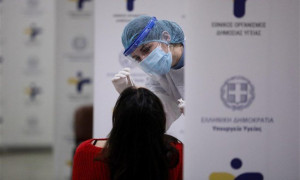Corfu Covid Watch: Significant reduction of infections in April
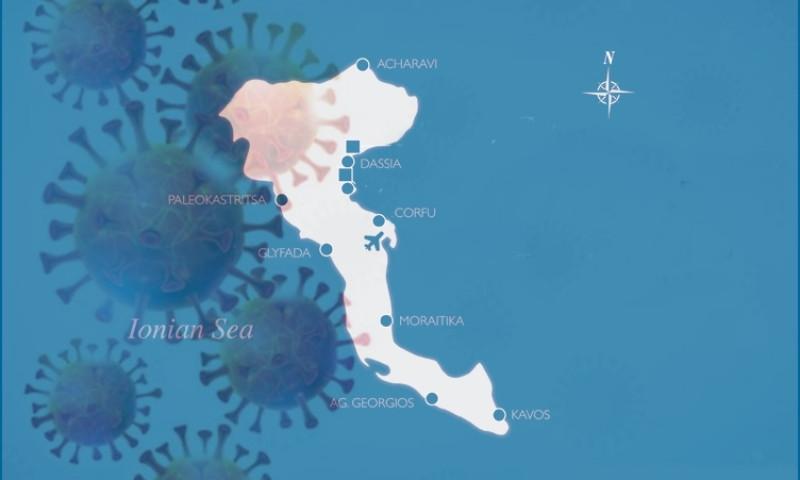
Corfu Covid Watch
05 May 2022
/ 17:45
CORFU. Since the beginning of the epidemic until 30 April 2022, a total of 175 Covid-related deaths have been recorded.
Corfu Covid Watch has published its Covid-19 report for April.
There was a recession of the pandemic in April both in Corfu and the rest of the country. The number of confirmed Covid cases has significantly decreased compared to March. This development confirms that the epidemic is constantly receding, despite temporary fluctuations.
Unlike the number of confirmed Covid cases, hospitalisations at Corfu General Hospital, serious cases and deaths remained at relatively high levels due to the spike in the epidemic that occurred in the second half of March.
Since the beginning of the epidemic until 30 April 2022, a total of 165 Covid-related deaths have been recorded among permanent residents of Corfu, 4 deaths among visitors, while there had also been 3 residents of Lefkada, 1 resident of Cephalonia and 2 residents of Ioannina, who had been hospitalised at the Corfu General Hospital and lost their lives.
After mid-April there had been a decrease in both hospitalisations and deaths, following the decrease in cases.
After Easter there had been a relative increase in cases due to the increased mobility over the festive period and the relaxation of protective measures. This increase does not seem to lead to a new spike in the epidemic and, despite possible fluctuations, the epidemic is expected to continue receding as summer is coming.
High vaccination rates and the large number of people who have been infected over the last few months are creating high levels of immunity, partly limiting transmission of the virus and keeping hospitalisations and deaths relatively low. However, we do not know how long the current high levels of immunity will last. The very high transmissibility of the Omicron variant and its ability to infect people who have been vaccinated or have recovered from Covid, as well as the relaxation of measures, make it possible that various unpredictable fluctuations and temporary spikes in the epidemic may occur.
The most likely scenario is that the epidemic will continue receding in the coming months and there will be a spike in the epidemic again after the summer, when a long time will have passed since the last vaccination or recovery from Covid for a large number of people, while the weather will again favour its spread. It is also possible that there will be new variants of the virus, which will create new waves of the epidemic, as has happened repeatedly in the past. This happened last summer, when the Delta variant appeared and dominated since the end of the summer.
It is important to remember that it is not possible to accurately predict the development of the pandemic, as it has been proved to date. It is necessary to continue to monitor its development in order to detect new outbreaks and new epidemic waves as soon as possible and to understand their characteristics, as well as the appropriate ways of preventing the uncontrolled spread of the virus.
A detailed analysis of the Covid-19 situation in Corfu can be found here.
There was a recession of the pandemic in April both in Corfu and the rest of the country. The number of confirmed Covid cases has significantly decreased compared to March. This development confirms that the epidemic is constantly receding, despite temporary fluctuations.
Unlike the number of confirmed Covid cases, hospitalisations at Corfu General Hospital, serious cases and deaths remained at relatively high levels due to the spike in the epidemic that occurred in the second half of March.
Since the beginning of the epidemic until 30 April 2022, a total of 165 Covid-related deaths have been recorded among permanent residents of Corfu, 4 deaths among visitors, while there had also been 3 residents of Lefkada, 1 resident of Cephalonia and 2 residents of Ioannina, who had been hospitalised at the Corfu General Hospital and lost their lives.
After mid-April there had been a decrease in both hospitalisations and deaths, following the decrease in cases.
After Easter there had been a relative increase in cases due to the increased mobility over the festive period and the relaxation of protective measures. This increase does not seem to lead to a new spike in the epidemic and, despite possible fluctuations, the epidemic is expected to continue receding as summer is coming.
High vaccination rates and the large number of people who have been infected over the last few months are creating high levels of immunity, partly limiting transmission of the virus and keeping hospitalisations and deaths relatively low. However, we do not know how long the current high levels of immunity will last. The very high transmissibility of the Omicron variant and its ability to infect people who have been vaccinated or have recovered from Covid, as well as the relaxation of measures, make it possible that various unpredictable fluctuations and temporary spikes in the epidemic may occur.
The most likely scenario is that the epidemic will continue receding in the coming months and there will be a spike in the epidemic again after the summer, when a long time will have passed since the last vaccination or recovery from Covid for a large number of people, while the weather will again favour its spread. It is also possible that there will be new variants of the virus, which will create new waves of the epidemic, as has happened repeatedly in the past. This happened last summer, when the Delta variant appeared and dominated since the end of the summer.
It is important to remember that it is not possible to accurately predict the development of the pandemic, as it has been proved to date. It is necessary to continue to monitor its development in order to detect new outbreaks and new epidemic waves as soon as possible and to understand their characteristics, as well as the appropriate ways of preventing the uncontrolled spread of the virus.
A detailed analysis of the Covid-19 situation in Corfu can be found here.



